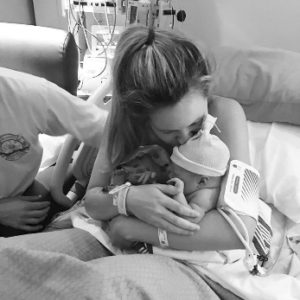 May is Maternal Mental Health month and we need to talk more about postpartum disorders. Celebrities such as Alyssa Milano, Gwyneth Paltrow, Chrissy Teigen, Brooke Shields and many more have started coming out in droves to share about their experience with postpartum disorders. They have money, success, nannies and endless resources yet, they still experienced postpartum symptoms. How could this be? Let us break down three facts.
May is Maternal Mental Health month and we need to talk more about postpartum disorders. Celebrities such as Alyssa Milano, Gwyneth Paltrow, Chrissy Teigen, Brooke Shields and many more have started coming out in droves to share about their experience with postpartum disorders. They have money, success, nannies and endless resources yet, they still experienced postpartum symptoms. How could this be? Let us break down three facts.
1. One cannot prevent Postpartum Disorders.
2. Postpartum Disorders are treatable.
3. It is unequivocally NO one’s fault when it comes to having postpartum disorders.
The Facts
According to the World Health Organization, 10% of pregnant women will experience mental health issues and a whopping 13-20% of women will experience a postpartum related disorder after giving birth. That’s 1 in 7 mothers! Many new parents are not aware of the difference between the struggle of being a new parent and the medical condition that can happen after a new child enters the world. There is a high probability of knowing someone with postpartum or chance of experiencing it in your lifetime. Therefore, I think it’s important that we all become more familiar with and de-stigmatize such a common disorder.
The postpartum period is up to one year after giving birth. However, if left untreated Postpartum Disorders can continue for months to even years. Postpartum disorders include anxiety, post-traumatic stress disorder, obsessive-compulsive disorder, depression and psychosis. Postpartum disorders impact both men and women. The cause for postpartum appears to be connected to the significant drop in the levels of hormones (estrogen and progesterone) after a woman gives birth. This leads to chemical changes in the brain that may trigger mood swings.
Risk Factors and Symptoms
There are several factors that may increase the likelihood of postpartum disorders, such as premature birth (infant time in NICU), poverty, limited support, history of mental illness or postpartum disorders, migration, colicky/difficult infant, lack of sleep, cesarean section and history of violence. However, having postpartum is NOT anyone’s fault and can happen to any new parent, regardless of race or socioeconomic status. It can also begin a few months after delivery. Yes, there are factors that may increase the likelihood of these disorders but, keep in mind that it may not happen at all.
There can be intense fear, anxiety, depression, isolation, disconnection and sadness following childbirth. Many new mothers feel shame and hide their feelings because of an internal or external pressure to be “supermom” and to portray this blissful joy that is sadly expected of new parents. Let’s get real about being a parent to a newborn…it’s no cake walk…you are recovering from labor/delivery, paying bills (because who needs paid maternity leave?!), trying to figure out breastfeeding, hormones are insane and you are a walking zombie due to never sleeping!
Getting Help
Fortunately, all of these disorders are treatable with social support, mental health counseling and medication. It’s important to note that there are times where outpatient psychotherapy and psychiatric services are not enough. Inpatient mental health treatment is necessary with Postpartum Psychosis as the child and mother may be at risk of harm. You should go to an emergency room if you are experiencing any psychotic symptoms and be under the care of a medical doctor.
If you or a loved one needs help, there are numerous resources available. Research has shown that mental health counseling and medication are the best treatments for these disorders. Reach out to your OB/GYN, mental health counselor, psychiatrist and/or primary care doctor if you are experiencing any Postpartum Disorder Symptoms.
Resources
Postpartum Support International: http://www.postpartum.net/get-help/psi-helpline-english-and-spanish/
Postpartum Support International Hotline (open 24/7 and in English and Spanish): 1(800)-944-4773
Crisis Text Line: Text HOME to 741741
National Suicide Prevention Hotline: 1-800-273-8255
National Suicide Prevention Website: www.suicidepreventionlifeline.org You can call for yourself or someone you care about; free and confidential; network of more than 140 crisis centers nationwide; available 24/7
Postpartum Progress Website: www.postpartumprogress.com
Postpartum Support Groups: http://www.postpartumprogress.com/ppd-support-groups-in-the-u-s-canada
#maternalmentalhealthmatters #stopmaternalsuicide #postpartum #mothersmatter #postpartumdisorders #momsmatter #mentalhealthmatters #postpartumdepression #mayismaternalmentalhealthmonth #listen2mothers #postpartumawareness #postpartumhealth #postpartumsupport #postpartumanxiety #newparents #perinatalmentalhealth #mentalhealthcounseling #momssupportingmoms
-Tiffany Lowther, LMHC

